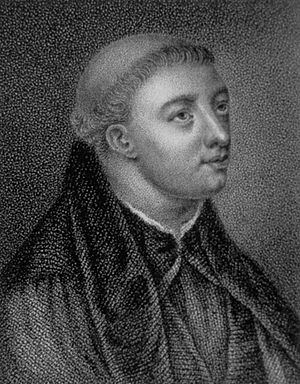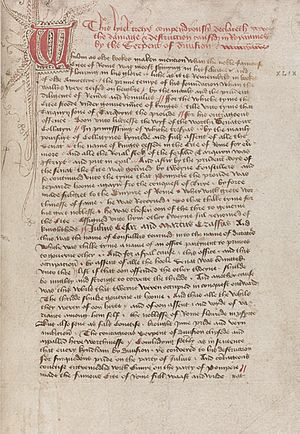John Lydgate facts for kids
John Lydgate of Bury (born around 1370 – died around 1451) was an English monk and a very busy poet. He was born in Lidgate, near Haverhill, in Suffolk, England.
Lydgate wrote an amazing amount of poetry, about 145,000 lines! He explored many types of poems that his hero, Geoffrey Chaucer, had used. Lydgate wrote long, epic poems like the Troy Book. This poem was over 30,000 lines long. It was a translation of an old story about the Trojan War. Prince Henry (who later became King Henry V) asked him to write it.
He also wrote Siege of Thebes, which was shorter but still an epic story. Another huge work was Fall of Princes, which had over 36,000 lines. This poem was about famous people who had bad luck. Lydgate also wrote many stories about saints, like St. Edmund and St. Alban.
Contents
Biography
Early Life and Education
When he was older, Lydgate wrote about his childhood. He admitted to doing things like stealing apples and making funny faces! He joined the Benedictine monastery of Bury St Edmunds Abbey in 1382. He became a subdeacon (a type of church official) in 1389.
We know from a letter from King Henry V that Lydgate studied at Oxford University. He was probably at Gloucester College between 1406 and 1408. During this time, he wrote one of his early works called Isopes Fabules.
Career as a Poet
John Lydgate loved the writer Geoffrey Chaucer and was friends with Chaucer's son, Thomas. Lydgate wanted to be a writer, so he looked for people to support his work. He found support from kings like Henry IV of England, Henry V of England, and Henry VI of England.
Many other important people also supported him. These included the mayor of London, the church leaders of St. Paul's Cathedral, and Richard de Beauchamp, 13th Earl of Warwick. His biggest supporter from 1422 was Humphrey, Duke of Gloucester.
In 1423, Lydgate became the prior (a leader) of Hatfield Broad Oak in Essex. But he soon left this job. He wanted to focus on traveling and writing. He wrote many poems, allegories (stories with a hidden meaning), fables, and romances.
His most famous long works were the Troy Book (written 1412–1420), the Siege of Thebes, and the Fall of Princes. The Fall of Princes (written 1431-1438) was his last and longest work.
Lydgate also wrote many shorter poems. Some of these were written in the style of Chaucer. They include The Complaint of the Black Knight and The Temple of Glas. Some critics have found Lydgate's later, very long poems to be less exciting.
For a while, people thought Lydgate wrote the long poem The Assembly of Gods. But now, no one knows who wrote it. He was also thought to have written London Lickpenny, a well-known funny poem. However, it's now clear he didn't write that one either. He also translated poems by a French writer named Guillaume de Deguileville.
In his later years, Lydgate lived and likely died at the monastery of Bury St. Edmunds. He even returned to his hometown and left his signature on a wall in St Mary's Church in Lidgate.
Modern Versions of His Work
Some of Lydgate's poems are available in modern English versions today:
- John Lydgate's Troy Book: A Middle English Iliad by D M Smith (2019)
- John Lydgate Troy Book: The Legend of the Trojan War by D.J. Favager (2021)
- The Siege of Thebes: A Modern English Verse Rendition by D.J. Favager (2018)
- The Legend of Saint Alban: In a Modern English Prose Version by Simon Webb (2016)
- Lydgate's Disguising at Hertford Castle Translation and Study by Derek Forbes (1998)
Famous Sayings
- Lydgate wrote: "Who lesith his fredam, in soth, he lesith all." This means: "Whoever loses their freedom, truly, they lose everything." He included this old proverb in his story The Churl and the Bird.
- Lydgate also wrote about King Arthur. He said King Arthur was crowned in "the land of the fairy". He also wrote that four fairy queens took Arthur to Avalon, where he rests under a "fairy hill" until he is needed again.
- Lydgate is also known for using the saying "He must nedys go that the deuell dryves." This means "He must go who the devil drives." Shakespeare later used a similar phrase in his play All's Well That Ends Well.
See also
 In Spanish: John Lydgate para niños
In Spanish: John Lydgate para niños
 | Shirley Ann Jackson |
 | Garett Morgan |
 | J. Ernest Wilkins Jr. |
 | Elijah McCoy |



